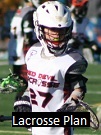5/16/2023 Practice Plan
From Lacrosse Plan Drills
| Time |
Drill
|
| 5 Min |
Active Stretching
|
| 8 Min |
Riding 7 vs 6 Keep Away
- Build a 20 yard by 50 yard coned in area
- Have two teams, each with a goalie
- Have 7 guys (1 goalie) clearing the ball in the box, and have 6 riding team covering 7
- Count the number of passes, keep a total count, as soon as ball is dropped, goalie out/in and other team starts with the ball
|
| 10 Min |
Stations: Two Game Situation Stations
Kavin/Justin - 1 on 1 Cuts
2 v 2 from x and from the top
|
| 10 Min |
Continuous 3v2 with Swaxlax
|
| 10 Min |
Defense Slide, Recovery, Collide Drill
Goal of Drill: Sliding and Recovering. Slide with a good angle, contain the dodger, call away and cover the inside
- 4 players and a coach in the drill
- Start with a coach in the middle as a crease player and 2 defensive player in the hole
- 3 Cones up top to show where they dodge from
- Line of players at the top, first guy goes without a ball or no stick (to focus on beating his man)
- 5th guy is playing straight up defense to try and force the guy down the alley or pick a side
- Inside a guy is the slide man, he is covering the coach, yells "Hot", slides under control, then calls the "away"
- Cover man holds the coach and then pops up when away comes
- Rotate to the next position. It goes dodger, defender, slider, cover man
|
| 10 Min |
Handling High Pressure Defense - 3 Man Press on Adjacents
- Attack the attacker. Running away from pressure will not help the cause. Teams that assume a defensive offensive posture against an aggressive defenseman will be playing into the opponents' defensive strategy.
- Emphasize short passes. The offense should focus on 7-10 yard passes (maximum). The idea is to be active off the ball and run all the way through the ball while recovering a pass.
- Run as fast as you can against pressure - simple advice, often forgotten.
- Communicate. Whenever a double team is initiated, the offensive men should understand that one of them will be free. The players should communicate such information with simple, easily recognizable terms.
- Make them pay. The most effective tool against a high-pressure defensive is to score. Any time a team overextends its defense, a score will make them pull back on their pressure.
- Stickwork. There is no better foil against high-pressure defense than solid stickwork. Daily stickwork drills are a must for every program.
Drills:
All drills should be designed to make the situation harder than it would be in a game. Situations are endless, but here are two that have proved effective:
- Drill 1, 6 vs 7 Long Poles, Drill the goalies to hold the ball vs pressure for two minutes inside the restraining box.
- Begin the drill with six offensive players controlling the ball inside the offensive restraining box against six defensive players, each playing his offensive man tightly, denying the adjacent pass.
- After 40-45 seconds of ball movement, the coach should release an extra man to double the ball or to provide additional pressure on an off-ball player.
- Drill 2, Bingo Drill
- Objective: To touch the ball into the restraining box against a double team, then locating the two-onone situation backside from the double-team.
- M1 (with ball) starts at midfield against defenders DM1 and LP1. The doublers do not play head-up at the start of the drill and work to a pinching position.
- M1 must run as fast as he can to the corner of the restraining box, establishing a 10-second count. This releases M2 and M3 from the midfield line, who break toward the ball-carrier (M1).
- D2 goes with M2 and M3, covering them on the backside.
- As M1 makes his run away from the double (DM1 and LP1), the open M2 or M3 calls "Bingo!", indicating his opponents, and M1 hits the open man (in this instance, M3) with a short pass. D2 must fill in on the backside of the ensuing 2-on-1 (DM1 and LP1) vs M3.
|
| 30 Min |
6 v 6 with Missions
- Coaches give up to 3 phases of missions to the players
- Offense example: Phase 1: Run tango, phase 2: two man game at x with timed cutting, phase 3: hawk
- Defense example: Phase 1: Amigo (3 man press), Phase 2: Long pole heavy on the ball, Phase 3: Double Early
- Goal is to throw different looks at both the offense and defense to see how they react and execute
|
